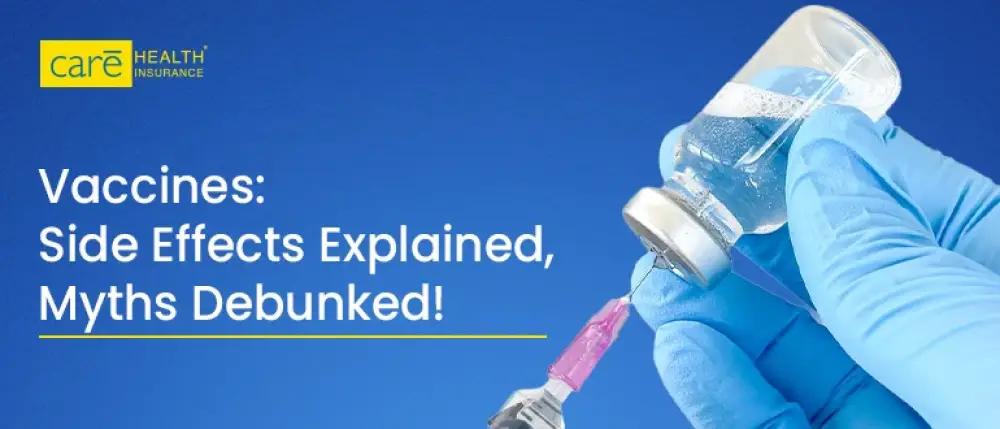Vaccines have saved millions of lives, yet conversations around them often come with confusion and concern. It’s common to wonder what’s real and what’s exaggerated when it comes to vaccine reactions. Some people feel uneasy after a shot, while others worry because of what they’ve heard online. In this blog, we’ll unpack the truth behind myths about vaccines, explain what typical side effects look like, and discuss what you can expect after getting vaccinated, especially in India. By the end, you’ll see that most reactions are mild, short-lived, and a sign that your immune system is doing its job.
What Are Vaccines?
Vaccines are one of modern medicine’s most ingenious inventions, tiny doses that train your immune system to fight off dangerous germs. From childhood schedules to adult shots like the flu vaccine, these protectors reduce illness, hospital visits, and even deaths.
Still, people worry, and that’s fair. Conversations often focus on its side effects or alarming stories that turn out to be myths. Let’s walk through what’s normal, what’s rare, and how to separate fact from fiction.
Why Should You Get the Flu Vaccine?
The flu vaccine is among the most commonly recommended immunisations for both children and adults. It helps protect against influenza viruses that change every year.
Here’s why it matters:
- Reduces your risk of catching the flu by 40–60% each year.
- Prevents hospitalisations and severe flu-related complications.
- Protects vulnerable groups, including infants, pregnant women, and the elderly.
- Builds herd immunity to reduce community spread.
Even if you get the flu after vaccination, it’s often milder and shorter. A minor side effect, such as a sore arm, is a fair trade for strong seasonal protection.
What are the Common Vaccine Side Effects?
Mild vaccine side effects are completely normal and usually mean your body is responding to the shot. Most people experience little to no discomfort, while some notice:
Typical and expected effects include:
- Pain or slight swelling at the injection site.
- Mild fever or tiredness.
- Soreness in the arm or body aches.
Less common but possible effects:
- Rash or mild allergic reaction.
- Prolonged fatigue or mild dizziness.
These reactions usually disappear within a few days. They’re your immune system’s way of saying, “Message received.”
In India, severe reactions are rare, and the healthcare system is well-equipped to handle them if they occur.
When to call a doctor:
If you experience breathing difficulties, rashes, dizziness, or swelling that extends beyond the injection site, contact your doctor immediately. Such reactions are infrequent but should always be checked. Therefore, being prepared goes a long way in managing any unexpected health situation. Having a comprehensive health insurance plan can make a real difference; it not only covers hospitalisation or emergency treatments arising from rare vaccine-related reactions but also ensures quick access to quality healthcare without the stress of sudden expenses. Whether it’s a precautionary check-up, consultation, or observation after vaccination, health insurance offers both financial security and peace of mind.
How Can You Manage Mild Vaccine Side Effects at Home?
Simple, practical measures usually do the trick:
- Use a cold compress for localised pain or swelling.
- Paracetamol for fever/aches (follow dosing guidance).
- Plenty of fluids and rest.
- Avoid strenuous exercise for 24 hours if you feel unwell.
Document any symptoms, and if they persist or worsen, contact a healthcare provider.
How Should You Prepare for a Vaccine?
Good preparation can make your vaccination experience smoother,
Pre-vaccine tips:
- Eat and hydrate before your appointment.
- Wear comfortable clothing for easy access to your arm.
- Relax your muscles during the shot to minimise soreness.
- Plan light activities for later if you feel fatigued.
Post-vaccine care tips:
- Rest and keep hydrated.
- Avoid alcohol for 24 hours.
- Use cold compresses for pain relief.
- Monitor any unusual symptoms and contact your doctor if they persist.
These simple steps make dealing with vaccine side effects easy and stress-free.
Why Do Vaccine Myths Spread and Which Ones Are Dangerous?
Misinformation often spreads faster than facts. Some Myths about vaccines arise from fear or misunderstanding, while unreliable sources amplify others. Let’s set the record straight and address common vaccine myths.
Myth 1: Vaccines can cause the disease they protect against.
Fact: Vaccines contain weakened or inactive parts of germs that cannot cause illness. They only stimulate your immune system safely.
Myth 2: Healthy people don’t need vaccines.
Fact: Even healthy individuals can catch and transmit diseases. Vaccines protect you and the people around you.
Myth 3: Natural immunity is better than vaccination.
Fact: Natural infections can lead to severe complications. Vaccines provide the same protection without the risk of illness.
Myth 4: Vaccines cause infertility or long-term damage.
Fact: No scientific evidence supports this. Global studies confirm vaccines are safe and effective.
Myth 5: I am pregnant, so I shouldn’t get the flu vaccine.
Fact: Pregnant women should especially get the flu vaccine since their immune systems are weaker than usual.
By recognising and rejecting these myths, you help protect yourself and your community.
>> Read More: Vaccines and the Diseases They Prevent
Final Words!!
Vaccines remain one of the safest and most effective ways to prevent disease. Mild vaccine side effects are a natural part of the immune response and usually subside within a few days.
In India, national health agencies continually monitor vaccine safety, ensuring that serious side effects are rare. Don’t let Myths about vaccines or misinformation stop you from protecting yourself, your family, and your community.
The flu vaccine and other immunisations safeguard against life-threatening illnesses, and that’s protection worth having. With reliable medical advice and health insurance coverage in place, you can confidently stay on top of your preventive health routine.
Disclaimer: All plan features, benefits, coverage, and claims underwriting are subject to policy terms and conditions. Kindly refer to the brochure, sales prospectus, and policy documents carefully.
